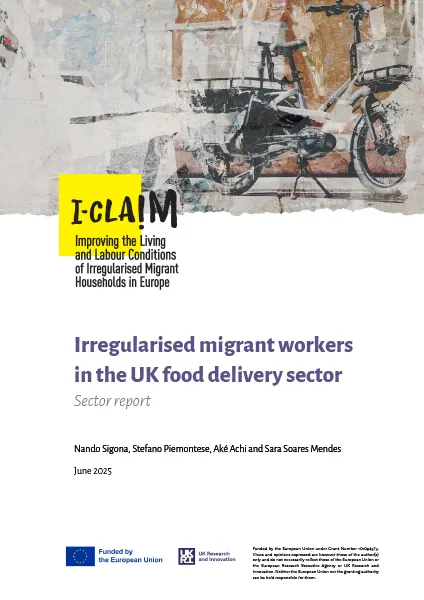Irregularised migrant workers in the UK food delivery sector
Nando Sigona, Stefano Piemontese, Sara Soares Mendes and Aké Achi
How to cite:
Sigona, N., Piemontese, S., Achi, A., Mendes, S.S. (2025) Irregularised migrant workers in the UK food delivery sector. I-CLAIM. DOI: https://zenodo.org/records/15775291
Irregularised migrant workers in the UK food delivery sector
Nando Sigona, Stefano Piemontese, Sara Soares Mendes and Aké Achi
This report investigates the experiences of migrant workers with precarious immigration status in the UK food delivery sector. It draws on in-depth qualitative interviews with twelve migrant riders and twelve stakeholders, alongside extensive ethnographic observations conducted in Birmingham from December 2024 to June 2025. The fieldwork captures a critical transitional moment in the governance of food delivery work—one in which immigration enforcement and labour regulation are being reconfigured under the newly elected Labour government.
Food delivery platforms have become an essential, if marginal, entry point into the UK labour market for migrants facing legal and structural barriers to formal employment. Marketed as flexible and accessible work, food delivery is increasingly shaped by algorithmic control, economic insecurity, and a shifting legal landscape. The report documents how migrants—many with insecure, lapsed, or irregular status—navigate this sector through informal strategies such as account sharing and substitution, which until recently allowed for a degree of economic survival.
This regulatory space has now narrowed. In early 2025, the Labour government introduced new compliance requirements for gig platforms, including more rigorous right-to-work checks, daily biometric ID verification, and restrictions on device and account sharing. These measures, presented as part of a broader crackdown on “illegal working,” embed immigration control directly into the digital infrastructure of platform labour. The report shows how these developments mark a significant expansion of the UK’s hostile environment policies into the algorithmically governed gig economy.
The findings reveal that immigration status is experienced not as a fixed legal category but as a continuum of insecurity. Participants include undocumented migrants, asylum seekers, visa overstayers, BNO visa holders, and EU citizens with pre-settled status. Regardless of distinctions in legal status, workers report shared experiences of surveillance, unpredictability and economic exploitation. Platform algorithms function as both employers and border agents, distributing risk while insulating companies from accountability.
Institutional trust is low among workers. Migrants rely heavily on informal networks, with limited recourse to unions, legal aid, or public services. The precarity of work bleeds into everyday life, affecting mental health, family relations, housing, and long-term aspirations. Some workers hope for status regularisation or onward migration, but most are trapped in a cycle of short-term survival.
In conclusion, the report argues that the food delivery sector has become a laboratory for a new mode of migration governance—one that fuses algorithmic management with immigration enforcement, producing a hyper-visible yet expendable workforce at the margins of legality and labour protection.
